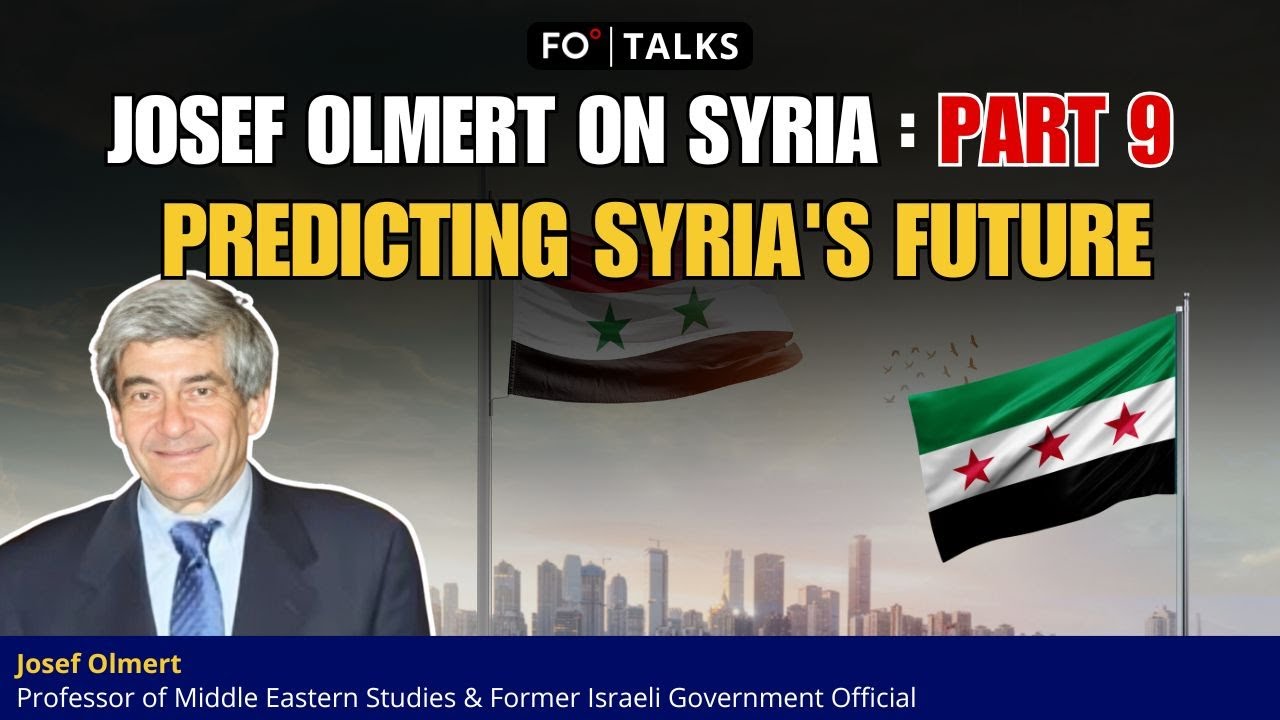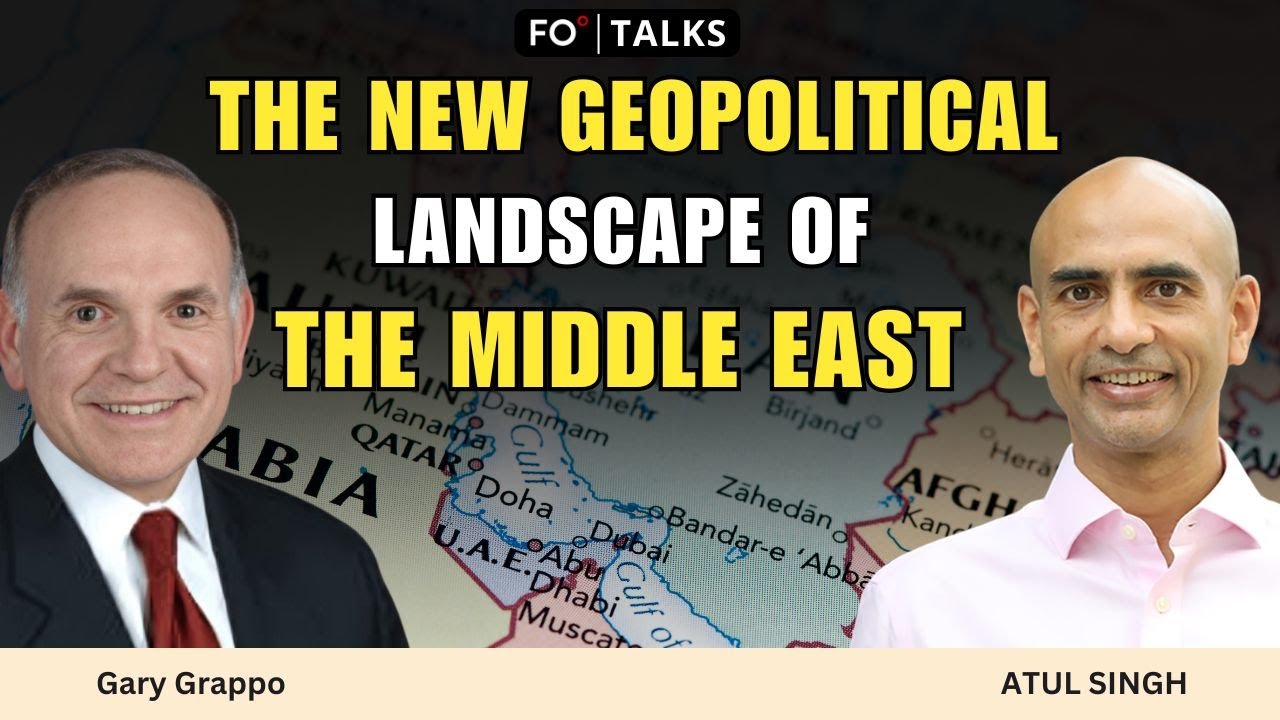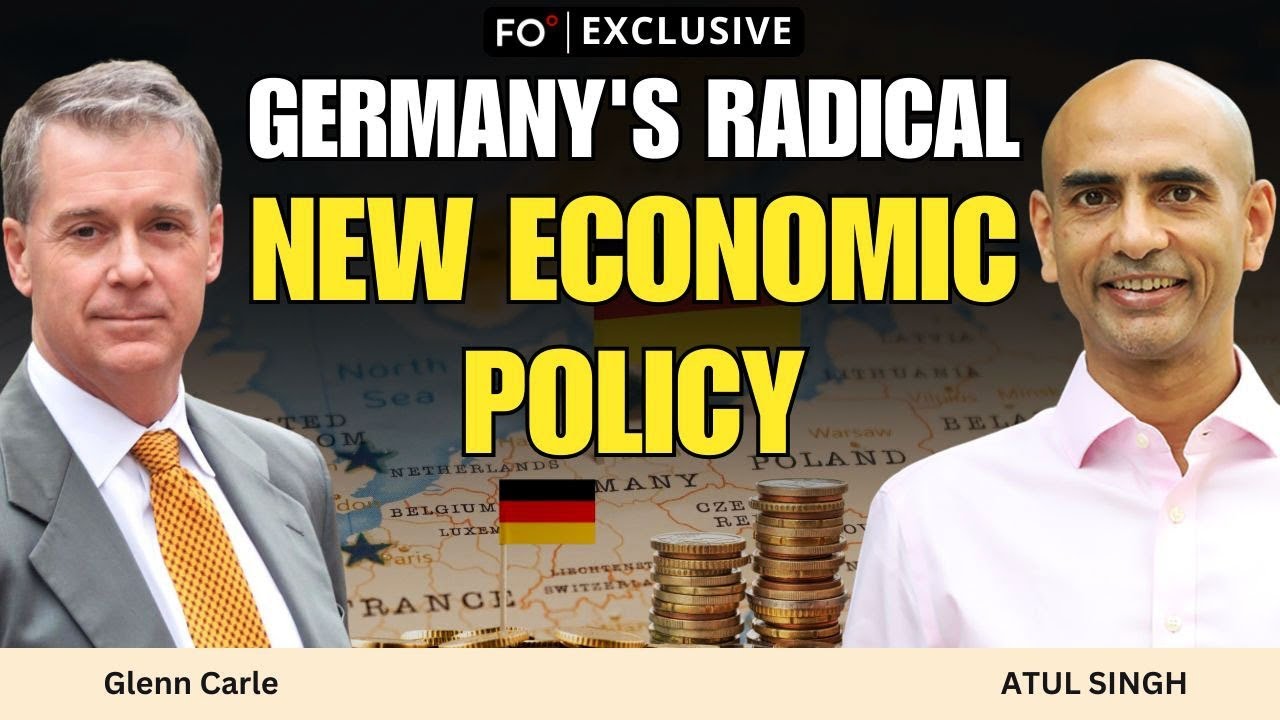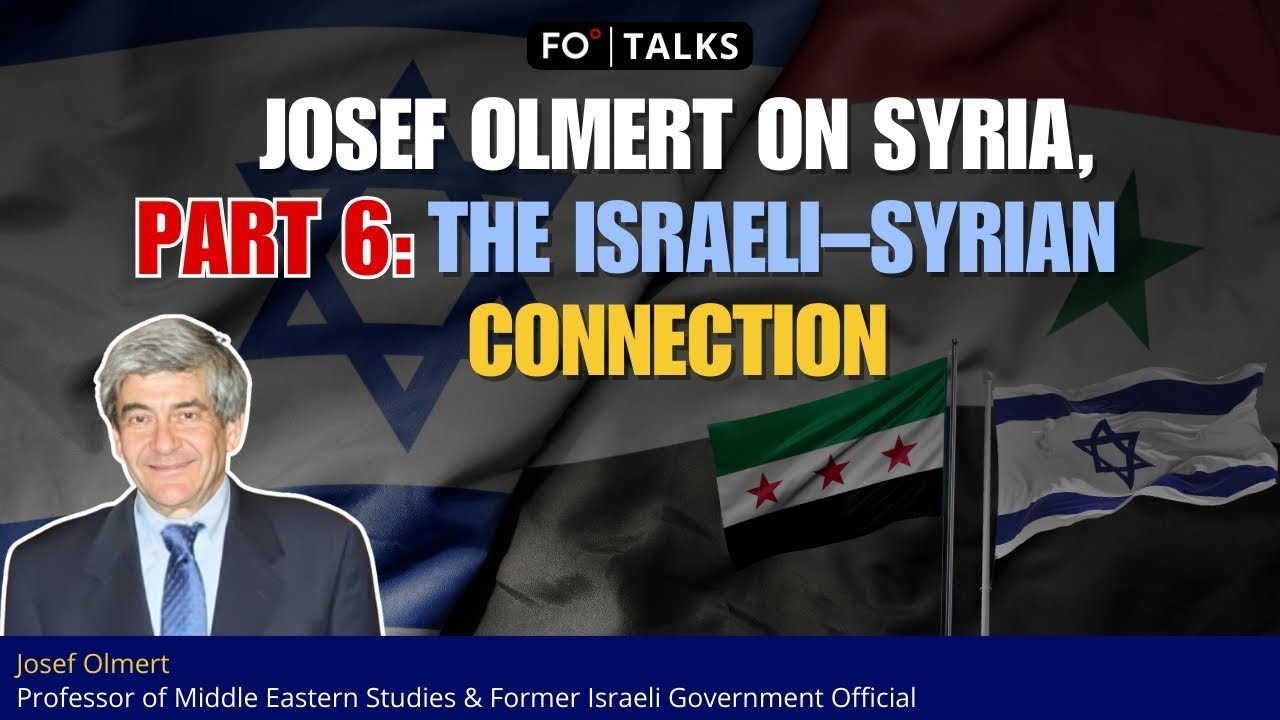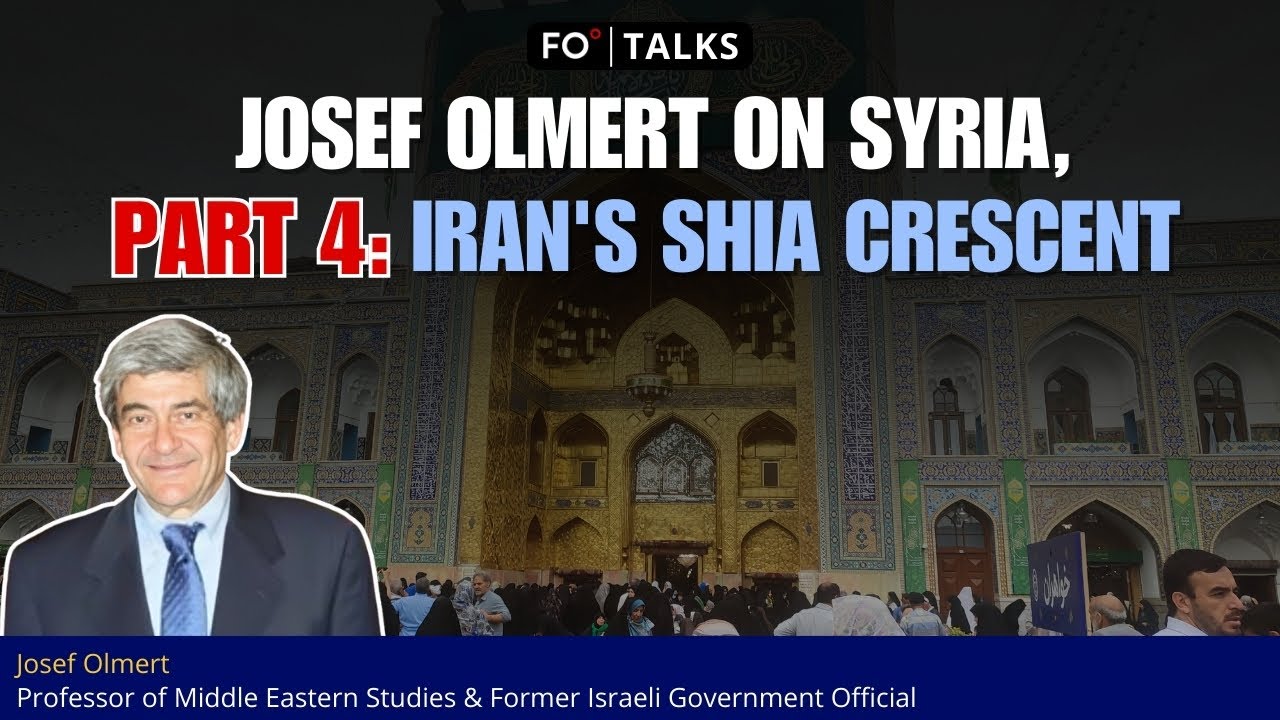Atul Singh: Welcome to FO° Talks. With me is Jean-Daniel Ruch. He is one of Switzerland’s finest diplomats. He has a sharp mind, he’s a man who spends a lot of time mulling over the state of the world, a wise man, a great sage. And today we’ll talk about International Law in the New Donald Trump 2.0 World. Welcome, Jean-Daniel.
Jean-Daniel Ruch: Thank you very much for having me on the program again.
Atul Singh: Well, it’s always an honor. Jean-Daniel, international law has always been a tricky field. We’ve had Hobbesian conceptions of international law, universalist conceptions of international law, and we now live in a world where Viktor Orbán has just taken Hungary out of the International Criminal Court, the ICC. At the same time, Rodrigo Duterte has been arrested and will now face trial in the ICC. So what is going on these days? Paint us a picture.
Jean-Daniel Ruch: I think we’re at the confluence of various streams. And when various streams are joining, then there are turbulences. This is what happens with water and with rivers, and I think this is exactly where we are. On the one hand, I would say we have the continuation of the world we have dreamed of and mostly Europeans have tried to establish after the fall of the Berlin Wall, which is a world in their image — meaning a world based on a number of international treaties started, of course, with the United Nations Charter, with an executive power which would have been the Security Council, a legislative power which would have been the General Assembly, and the judicial institution. So typically, the three powers of democracies, according to the theory of democracy by Montesquieu from the Age of Enlightenment. Now, since this project was put in place — let’s say, in the ‘90s — and the negotiation of the Rome Statute of the International Criminal Court, which is precisely the judicial arm of the system. Since the end of the ‘90s, a number of things have happened. And actually, what we see with Orbán, with Netanyahu traveling to Hungary, with Donald Trump ignoring totally or despising anything that might restrict the use of American economic, financial, political or military power... What we see is not surprising, because this is the natural result, I would say, of a slow sliding of international law into something that has become more the law of the force rather than the force of the law. In other words, the great powers have tended, on important issues, on key issues like the use of force, to ignore international law increasingly. I would say that there are three defining moments from where this process has been starting. Maybe the first one is the Kosovo wars or the bombings of Serbia by NATO in 1999. This decision to bomb by NATO was taken without the approval of the United Nations Security Council. And by international law, the use of force must be permitted by the Security Council unless you are in a situation of legitimate defense. And it was certainly not the case for NATO in Serbia in those days. The second key moment, which came as a kind of shock — I mean, a terrible shock — for the United States and the world, was the September 11 attacks against the Twin Towers in New York. And at that point, the Americans, of course, they were seeking revenge, they were seeking protection. They launched this War on Terror, which has very few rules, even though the first military operation in the context of the War on Terror was the invasion of Afghanistan. And the invasion of Afghanistan was indeed based on the resolution of the Security Council. So you can say this was a lawful war. But maybe the most important breaking point in the last 30 years has been the war on Iraq. Because the war on Iraq is as unjustifiable as the Russian aggression against Ukraine. There was no direct threat. It was not a case of legitimate defense. There were no weapons of mass destruction, as poor Colin Powell pretended in an ominous meeting of the Security Council. And there was no decision of the Security Council. So in terms of international law, UK said this is an act of aggression. And ever since—
Atul Singh: And we must remind our viewers and listeners that both Germany and France opposed this decision. Neither Jacques Chirac nor Gerhard Schröder went along with it, and Tony Blair’s support of George W. Bush really cost him, in many ways, his legacy.
Jean-Daniel Ruch: Yes, this is absolutely true, absolutely true. I think that this will stay as a dark spot in the legacy of Tony Blair. And quite the opposite, I believe that both Schröder and Chirac — but also Jacques de Villepin, who made this amazing statement in front of the Security Council when Colin Powell was falsely pretending that he had the evidence that Iraq was producing weapons of mass destruction — Villepin, who is back in the public stage in France right now, saved the honor, I would say, of the Western world back in those days.
Atul Singh: And he has support even among socialists because of that, and he may one day be president again. Who knows?
Jean-Daniel Ruch: Well, the line between left and right in France has been pretty blurred since Macron came to power, because Macron comes from the socialists. But then you can say is more of a centrist allied also with forces which you would define as rightist. So I think the political spectrum in France is not so clear-cut as it used to be in the times of Chirac. Whether Villepin has a chance to become the next president, we will see, I’m not sure. I don’t think he — he lacks the apparatus, the political party for that. But certainly his memory is very positive, mostly because of that famous speech in 2003 in front of the Security Council. And here’s a vision, which is a vision precisely based on international law. But the point is here that we have seen a slow sliding of respect for international law by great powers ever since 1999 or 2003. You can talk about the war in Georgia in 2008, you can talk about the war in Libya, you can talk about bombings of the Americans in various places in the world, even under Obama, which lacked, in my view, any sort of legal basis — all the way to the aggression of Russia against Ukraine. So this crumbling of the international law superstructure with international institutions, is not quite surprising because it’s a natural process now, which is, of course, encouraged by the behavior of Donald Trump, who seems to know absolutely no law, no faith, no religion.
Atul Singh: So basically, by your analogy — to take the water metaphor — like water dripping on a stone, it has worn away that bit of the stone, and we now are in a more Hobbesian world.
Jean-Daniel Ruch: Well, definitely in a more Hobbesian world, absolutely.
Resilience of legal institutions and the South Africa–Israel case
Jean-Daniel Ruch: But still, we should not also ignore the forest behind the tree. There are a range of international institutions based on treaties, based on international law, which are continuing to work. I mean, of course, what we see is Gaza, where there is absolutely difference, no respect whatsoever for international humanitarian law, the Geneva Conventions, which regulate the behavior of armies within a war. We see an ignorance of international law, the Charter of the United Nations, in the case of the Russian aggression against Ukraine, just like we’ve seen it when George Bush Jr. attacked Iraq. But still, be it in Geneva, be it in New York, be it in Brussels, don’t forget regional institutions. There are a number of international institutions based on the law which continue to work every day. And then, on the more sensitive issues like peace and war or war crimes, the ICJ and the ICC have proven in 2024 that they can operate, even in this highly politicized environment, and operate in a manner which is honestly very reasonable. Now, we will see. We all know that there are terrible pressures exerted on the members of the judiciary — the judiciaries, I should say, because we are talking about two separate courts in The Hague, both of them are in The Hague — to drop cases, especially the cases against the allies of America, meaning Israel. But so far, they seem to stand their ground — both the personal, but also those who support the courts, who are funding the courts, which are mostly the Europeans and other supporters, like many African countries, South Africa being the most vocal.
Atul Singh: So you mentioned the ICC — the International Criminal Court — and you mentioned the ICJ — the International Court of Justice. Most people don’t know the difference between the two, so please explain. What are these two institutions and how are they similar? How are they different? What is the jurisdiction and what is the status quo right now?
Jean-Daniel Ruch: I think it’s very important to keep in mind that the ICJ — the International Court of Justice — which was created by the United Nations Charter back in 1945, is dealing with states. Its main task is to resolve disputes between states. The International Criminal Court deals with individuals, not states. The International Criminal Court is a court of criminal law. So it is there to punish individuals — and I really have to stress individuals — for their behavior which might be a violation of the Rome Statute. The Rome Statute is sort of the basic law — or the criminal code, if you want — of the International Criminal Court. And the Rome Statute defines what is a war crime, what is a crime against humanity, what is a crime of genocide and what is a crime of aggression. And the International Criminal Court has jurisdiction over the territories and the nationalities and the persons of the nationality of the signatories and the member states of the International Criminal Court, which is by far not the whole world. But if an American or Russian — both have not ratified the ICC, are not members of the ICC — but if a Russian citizen or an American citizen commits a war crime on the territory of a state which is party to the court, then there is jurisdiction over that person. So this is for the ICC, whereas the ICJ reacts to complaints filed by individual states against other states. The most famous case over the recent years has been the case of South Africa against Israel. South Africa pretends that Israel is violating the Convention on Genocide, which was approved after the Second World War as a reaction precisely of the genocide committed against the Jews, the Holocaust. And the court has found that it had indeed jurisdiction to rule over this complaint filed by South Africa. And as a result, in January of 2024, the court issued a ruling which is saying that yes, there is a plausible risk of genocide, and we order Israel to take a number of measures to prevent that crime from happening. Now, there is some correspondence between the two. Because let’s say that the International Court of Justice, in the case of South Africa against Israel, finds that indeed genocide is taking place in Gaza. Then this would have an effect on the International Criminal Court, because it would be almost impossible for the International Criminal Court to ignore that count, that accusation, against the leaders of Israel. And probably they would then have to amend the indictment against the leaders of Israel, and probably they wouldn’t have to amend the indictment against Netanyahu to introduce the charge of genocide. So far, he is only — “only” between brackets — indicted for war crimes and possibly crimes against humanity. Is that clear enough?
Atul Singh: Yes, clear enough. Absolutely clear enough. But states—
Jean-Daniel Ruch: ICJ, states; ICC, individuals. Very important.
Limits of enforcement and the role of universal jurisdiction
Atul Singh: But what is the status quo? Have over the years these institutions suffered? For instance, we know that the ICC is powerful and it tried to bring Kenyan leaders to justice. That case fell apart. We know that the US is not a member of the ICC. We know that Hungary is withdrawing from the ICC. Similarly, we know that Israel and indeed many other countries have regularly ignored the ICJ. So how did they begin? When did they begin? And what is the status quo now?
Jean-Daniel Ruch: Well, I think what we need to say is that one of the weaknesses of the system. If you want, again, to try to think along the lines... we wanted to bring an international system which is a mirror of the domestic system, with the legislative, an executive — the Security Council — and judicial bodies. There is one missing link there, which is a police. You don’t have a United Nations police force. So therefore, these institutions have to rely on the willingness of the member states of the United Nations or of the International Criminal Court to bring those people indicted by the court to justice. In the case of Israel and Palestine, what happened is that in November, the judges of the International Criminal Court issued three arrest warrants based on the indictments: two against senior Israeli leaders, one of them being Prime Minister Netanyahu, the second one the former Defense Minister Yoav Gallant, and also one against the senior Hamas leader Mohammed Deif, the leader of the military branch in Gaza. There were two more indictments requested by the prosecutor against Hamas leaders, but in the meantime they have been killed by Israel — one of them in Gaza and the other one in Tahrir. So these arrest warrants create a legal obligation to all member states of the International Criminal Court, including Hungary. Which means that, in welcoming Netanyahu for a weekend in Budapest, Hungary has violated its obligations according to international law and to the International Criminal Court. But there is no enforcement mechanism, so nobody can really take sanctions. The International Criminal Court can only complain. It can say that Hungary has violated its obligations, but it will have no legal or practical consequences, I’m afraid.
Atul Singh: So that means, without a police force, in a way the court depends upon whoever brings a case to justice and the will of strong states to apprehend culprits or to impose some kind of order.
Jean-Daniel Ruch: Yes. You know, for instance, we had a similar dilemma when I worked for the Yugoslavia War Crimes Tribunal. This was actually the precursor, the pioneering work together with the tribunal on Rwanda, which then led to the creation of the International Criminal Court. The International Criminal Court has a universal jurisdiction, whereas the ICTY — the International Criminal Tribunal for the Former Yugoslavia, or the one for Rwanda — had a jurisdiction limited to the territories of Rwanda and of the former Yugoslavia, and also limited to the duration of the war. So we had the same problems. When I joined the Yugoslavia War Crimes Tribunal, we had about 20 or more indictees — people indicted for war crimes or crimes against humanity or genocide — who were at large, and we had no police force. So what we did, we put pressure on the states sheltering these war criminals through the European Union, mostly, and the USA. We were lucky, because all of these states aspired to join the European Union. So the European Union put in place what they call political conditionality, meaning, if you want to make progress toward the European Union, then you have to deliver the persons indicted for war crimes to the tribunal. And it worked. At the end of the day, all our indictees ended up behind bars and in front of the court, and most of them were sentenced heavily. Some of them were acquitted — which I wouldn’t consider unfortunate — but this is justice. I was part of the prosecution, so when you’re a prosecutor, of course, you want to see the people you have indicted being sentenced. But at the end of the day, 92 senior officials — political leaders, military leaders, militia leaders — were sentenced by the court, which is a pretty good result in terms of justice, maybe the best. And from all sides — this is also important to underline—
Atul Singh: After all, all prosecutors measure their success through convictions — and you did a bloody good job by that metric.
Jean-Daniel Ruch: Well, of course. Now, if you look at the number of crimes committed between ’91 and 2000 on the territory of the former Yugoslavia, there were many more hundreds of perpetrators we would have liked to bring behind bars. But this was not possible for that court, of course, it was too small. And there you have to rely on the domestic judiciary. But of course, we were lucky, because we had the most significant powers for that part of the world who were really supporting us — especially the European Union. I must say, after the September 11 attack, the Americans lost interest. They continued to pay lip service, but their real interest was in the Middle East. And they moved all their assets — you know, intelligence assets and things like that — to the Middle East, because they were preparing for what was to follow. But the difference here, if you consider the case of Israel–Palestine in front of the ICC, is that the main power in the world is actually protecting the Israelis. It doesn’t mean it has no impact at all. To give you a very precise, concrete example: It seems that the airplane of Mr. Netanyahu, when he left Budapest to go to America — because he went to Washington after Budapest — he made a detour because he was afraid to overfly some countries whom he believed might arrest him should there be an emergency landing. So he had a few hundred kilometers... he had to turn around, for instance, the Netherlands, of course, which is the host of both courts. Another thing is, so it means, basically, that Netanyahu or Gallant cannot travel anymore anywhere in the world. There is a risk. I can give you also a few other examples, because many countries in the world — and most of them member states of the International Criminal Court, including Switzerland — they have in their criminal legislation something called universal jurisdiction. It means that for international crimes — the crimes I have mentioned before: genocide, crimes against humanity, aggression and war crimes — there is jurisdiction even if the crimes were committed elsewhere in the world, and even if no Swiss citizen was involved. So I was confronted — I was ambassador in Israel — with two cases where senior Israeli figures either had to shorten their trip in Switzerland — that was the case of the former Foreign Minister Tzipi Livni — or eventually renounced their trip to Switzerland — that was former Prime Minister Ehud Olmert — because of the risk that they could be prosecuted in Switzerland, for crimes committed in the context of a totally different operation; nothing to do with Gaza today. It was another military operation in Gaza in 2008–09 dubbed the “Cast Lead,” which was also hundreds of civilian victims. And when Tzipi Livni was in Switzerland, an NGO filed a complaint against her, and there was a real risk that she could be brought in front of the federal prosecutor. And the same thing would have happened if Ehud Olmert, the Prime Minister then, would have come to Switzerland. So still, these instruments — international criminal law — it may have some deterrent effect on some of them. And it may pose a risk when they travel. Another example from last year is this Israeli soldier who was stupid enough to boast with videos of him in Gaza looting houses. An NGO found out that he was in Brazil. Brazil, who is a member of the court, who is also the system of universal jurisdiction. And they filed a complaint against him, and the Israeli embassy, I guess, managed to extract him before he was arrested. So basically, each and every Israeli soldier who has been involved in the war in Gaza runs the risk of being arrested depending where he’s traveling. But places like Brazil or Western European countries — maybe not Hungary now — are unsafe for them. And there are NGOs who are reviewing all these videos, all the materials you find on the Internet, to try to identify the names of the soldiers, put them on the list and make sure that they are being arrested, or that a complaint is raised against them should they travel in a country where there is universal jurisdiction.
Israel, antisemitism and the ICC’s global reach
Atul Singh: I see. So some would say that this universalism, in a way, is new imperial and even antisemitic. That’s what you hear a lot, especially in Israel.
Jean-Daniel Ruch: Well, I think this is wrong, because the ICC has been prosecuting people all over the world. I think that their prosecutions are based on the merits of the case. And then you have also a number of levels of checks and balances to make sure that the prosecutor cannot raise an indictment or issue an arrest warrant without any checks and balances. The indictments and the arrest warrants have to be reviewed by a chamber of three judges, and they are the ones, at the end of the day, who take the decision on the basis of the request from the prosecutor. So that’s one thing. The second thing is that, as we see, Israel is certainly by far not the only state which has been — and it’s not about states, it’s about individuals. So not only Israeli citizens have been targeted by the prosecutor for war crimes or crimes against humanity. I would say it is rather the opposite which is true: Israel has been enjoying for far too long total impunity. Because the crimes falling under the jurisdiction of the ICC are not new. In Article 8 of the Rome Statute, where they define all the war crimes, there is one of them which is exactly the settlement enterprise. So from that point of view, I think it’s pretty easy to argue that each and every illegal settlement — and they are all illegal — so each and every settlement in the occupied Palestinian territory is a war crime. And this has been going on since the ‘70s in total impunity. We now see also that crimes are not being punished inside the judiciary, even crimes which are very well documented by the Israeli system. And you have also NGOs in Israel — like Breaking the Silence, B’Tselem — who are extremely professional in documenting war crimes. But it almost never happens that there are proper investigations and prosecutions and convictions of persons involved in war crimes in those wars. Because one thing that has to be underlined that I have not underlined before is that the International Criminal Court functions according to the principle of subsidiarity. It means that the prosecutor has to prove before opening a prosecution that there was no proper prosecution in the domestic system. So if Israel would properly prosecute its soldiers or the persons having committed crimes, for instance, in Gaza, then there would be no need for the ICC to get involved. Now, I think you know this is a defense mechanism that has been built over the years, and I would say more forcefully over the past years, which is that every criticism of Israel becomes immediately antisemitism. Frankly, I think it is bad, because there is antisemitism. There are rising antisemitic acts and talks all over the world, including in Switzerland, including in European countries. And by enlarging that much the scope of the definition of antisemitism actively, you sort of reduce its legitimacy or its credibility, because everything becomes antisemitism. So I think really that this is not good. This way to define each and every criticism of Israel as antisemitism is diluting the power of the truth for the legitimate critique or the legitimate actions in prevention measures where truly antisemitic acts are taking place.
Duterte, Kenya and the ICC’s political dilemmas
Atul Singh: So let’s go back in the past and talk about Kenya, where the ICC initiated a prosecution and then it spectacularly fell apart. Do you think the allegation that arose in Kenya — that this was a new imperial institution which tried African leaders in Europe, which imposed universal standards of justice just as Europeans had once tried to enforce universal religion — has any merit?
Jean-Daniel Ruch: I don’t think so. Well, certainly the prosecution did a very bad job. And the justice, the ICC, did not do a good — actually, it’s a good job when you have people who are acquitted. Well, I mean, it means that justice works both ways also. I think when you have opponents to Putin who appear in front of Russian courts, it does not happen very often that they are being acquitted. So the fact that people are acquitted is also saying that this justice provided by the ICC is fair. Now, the criticism about neo-imperialism I think is really far-fetched because Kenya joined, as a sovereign state, the ICC, recognized the jurisdiction of the ICC. Plus, when the troubles happened — I think it was in 2008 — that you had this post-electoral violence in Kenya. Obviously, the Kenyan system, the Kenyan judiciary, was not in a position to do its work of justice for the crimes committed in the course of these riots and acts of violence. So I think there is another cause, maybe more important, in the criticism towards the ICC: that it was a court designed as a kind of neo-imperialist instrument against African countries. The argument is that in the, maybe, ten–15 first years of its existence, it dealt only with cases in Africa. And it didn’t deal with cases outside of Africa — for instance, the Iraq war. And I think that’s maybe one of the reasons why many in Africa have designated this court as an imperialist instrument. But I think now they cannot use this argument anymore, because you have the Philippines, Duterte, and you have Israel–Palestine.
Atul Singh: So let’s talk about the Philippines leader, Rodrigo Duterte. He had pulled out of the ICC, but now he’s been arrested by the ICC, and he will be tried. What’s happened there?
Jean-Daniel Ruch: Listen, I’m not familiar with all the legal details. But what any state can do — and this is based on the status of the ICC — is to request, even if you are not a member, to recognize the jurisdiction of the court for a specific duration of time. For instance, I know the case of Palestine a bit better. I know that in the case of Palestine, once Palestine obtained the status of an observer state at the United Nations, immediately they approached the ICC, and they asked the ICC to investigate — even retroactively — on crimes committed on the territory of Palestine, meaning the occupied Palestinian territory: Gaza, the West Bank and East Jerusalem, from 2014. And that gives the authority and the jurisdiction to the International Criminal Court to do this sort of investigation. So again, I’m not too familiar with the case in the Philippines, but I can imagine that something like that happened.
Atul Singh: Alright. So basically, some say that Marcos used the ICC to settle a domestic political score. Yes, of course, the state arrested Duterte on an ICC warrant, but many say it was convenient — it was fundamentally a political vendetta. What do you say to that?
Jean-Daniel Ruch: The eruption of politics into criminal law is an old story. There is nothing new to that. I’m pretty confident — because I know some of the judges and the judicial personnel in The Hague — that this is certainly not the political calculations they had in mind when they issued the indictment. It seems pretty clear to me that their base, their logic — and this is sometimes a challenge when you are in the prosecutor’s office in The Hague. You receive all sorts of pressure telling you, “You know, if you indict that one, that will create chaos in the country,” — so many states can try to interfere and push you in one direction or another. And I know that some of these personnel in the ICC have been trained in the Yugoslavia War Crimes Tribunal, where the line has always been: You do your work on the basis of the legal merits and never on the basis of political calculations. And I think that principle is what they have used. If you look at the situation the other way around: Imagine what would have been the reaction if the court had said, “Oh yes, this guy is a criminal. I mean, the indictment is very convincing. We have all elements to indict him and issue an arrest warrant. But because it’s a political calculation and it may be a political vendetta in the Philippines, we’re not going to do it.” I mean, they would not fulfill their mandate.
Atul Singh: So the challenge then is that you’re damned if you do and damned if you don’t. Now we are living in a new world. Donald Trump is now president again. The US is not a member of the ICC. As you said, it developed cold feet after 9/11. He does not seem to have much interest or respect for either the ICC or the ICJ. And of course, Viktor Orbán has withdrawn from the ICC. What exactly is going on? Do you see more pressures on both these institutions and on international law as the far right rises, even in Europe — and, of course, not to mention all the other things happening around the world: increased violence, extrajudicial violence as well — for instance, in Mexico, Brazil and elsewhere?
Jean-Daniel Ruch: Yes, I think you’re absolutely right. Times are getting tough. And when times are getting tough, you have to count on powerful supporters also to counterbalance the attacks you will be subjected to. And the only forces I can see who can counterbalance the wind which is coming from those, let’s say, rightist, nationalist, conservative movements who believe in the law of the force rather than in the force of the law, is to maintain a very strong Europe allied with Latin American, African and some Asian countries to uphold the importance of international law. In the case of the International Criminal Court, those states are mostly the European states, who are also defenders of the court. So we have to count on France, Germany, the UK, Spain, Italy and a few other states — the Nordic states, of course — to be principled and to continue to invest into that court. Which is — frankly, I think in a way, it’s a good thing that they are very much in the media today. Because it raises attention to them, and to the power they have, and to the deterrent. And maybe that can create a deterrent effect for future warlords or future leaders when they enter a war. Frankly, have you ever thought about the financial investment? Do you know what is the budget of the ICC and the military budget, for instance, of the United States? The budget of the ICC per year is exactly 4,400 times lower than the military budget of the United States. So with the military budget of the United States, you could create every year 4,400 tribunals. So you can say that having a court is a cheap investment and potentially, it may have a big impact. So I think it would be wrong for all peace-loving countries who believe in international law, even though we are now going through difficult moments, to give up. Quite the opposite: It is the time when we have to reassert the legitimacy of this court. Now, of course, we don’t know what will happen in Europe. We don’t know who is going to come to power over the next 20 years in the main European countries. But there is something I’m sure of: Deep inside, the drive, the greed, almost, for justice will not disappear. Because this is maybe the thing which is the most common in mankind: the sense of justice. And you see that — when you have kids, you have two children, you give a chocolate to one of them and not to the other one, of course the other one will feel a sense of injustice. It is as basic as that. And this drive for justice in whatever form will continue to animate the human soul and human feelings for as long as there is such a thing as mankind.
Atul Singh: So Jean-Daniel, point taken. But debates about what is justice go back thousands of years. Is it retributive? Is it normative? Is it restorative? What exactly is justice? Come on, Plato was discussing it. People in the East were discussing it. The Old Testament and the New Testament have different ideas of justice. And whilst you’re absolutely right that yes, there is a desire for justice that animates the soul, it’s more difficult to agree upon what exactly is just. And also, it is in human nature to bend and break those laws of justice and to be unjust, too, because human beings are complicated. So it’s a song and dance that seems to be going on at all times.
Jean-Daniel Ruch: Yes, and I understand the complexity of the matter. I think in the United Nations, they have thought a lot about that and they have elaborated a kind of concept of what they call transitional justice, which is based on four pillars. One of them is the punishment — so that’s what you would call retributive justice. Another one is the right to know — so the right to truth is also part of the justice process. And actually, if you look at the truth and reconciliation commissions that happened in various places in the world — thinking more about the successful ones. In my view, less South Africa, and more maybe Colombia or Guatemala. And then the third principle is the right to be sure that this will not happen again — so the non-recurrence or non-occurrence right.
Atul Singh: Preventive, deterrent.
Jean-Daniel Ruch: Yes. States have to take the measures.
Atul Singh: Yeah, you don't really want to punish somebody who’s a pickpocket — you don’t want him to suffer, but you want to make an example out of him so that others don’t become pickpockets.
Jean-Daniel Ruch: Yes. And then we can go into details on all these four principles. The last one is the right to compensation for the loss and the sufferings you have. But you’re absolutely right: If you take the principle of the truth and reconciliation commission, the idea is to depart from retributive justice and to say, “Well, what is more important is truth and forgiveness. And to have truth and forgiveness, we can make an arrangement with you. We know you have committed awful crimes, but maybe know they were not the most serious.” So you come, you tell your story, you bring truth — which is also a way to bring relief to the victims or the families of the victims — and then either you’ll have a lighter sentence or you will have no sentence at all. That’s the way truth and reconciliation commissions have been working. So I think you have all these elements. There are also some traditional ways — especially in Africa, probably elsewhere also — to deal with justice. For instance, if somebody is caught committing an awful act — not talking about war crimes there — then the whole community is meeting on the main square of the village, or in some cases, it’s still under the tree, I hear. And then the guy is sort of confessing his sins and talking about that. And then the community will sort of forgive him and go back to a situation of harmony. Because these unlawful actions are destroying the harmony of the village, and what is more important for the village than punishment is to restore the harmony of the community. So there are all sorts of very interesting mechanisms, you are absolutely right. But when it comes to very serious crimes — the most serious crimes committed by very senior officials — I think it’s very difficult for any domestic judicial system to do a trial. You know, I think when you talk about Duterte — definitely, if he had been tried by the judiciary of the Philippines, first, there might have been all sorts of pressure, intimidation, blackmail, maybe worse, against the judiciary, so it’s difficult. But then it would have appeared as a political vendetta, and then it would have been much more difficult because of the political implications of such a trial in Manila. So that’s why also there, I think, for such cases, you need — as a kind of last recourse, not as a first-instance jurisdiction, necessarily — but as a last recourse when no other judicial or non-judicial means can be found, then I think the ICC remains a court which makes sense and which remains important. And I really hope that, despite all the tremendous pressure they are subject to, we, the Europeans; we, the Africans; we, the Asians; the Latin Americans — we will stay firm, and we’ll continue to work for a world. Because at the end of the day, what is it about? It is about a world which is ruled by dialogue, by the law — and not by the force. Because I’m very much afraid that these confrontations we see now — now it’s a trade war between China and the United States — but you never know how this can escalate one day. And mankind has much more, I would say, challenging issues than trade wars — I’m thinking, of course, about the climate and the consequences of climate changes, like migrations, like the preservation of resources also, including the soils. These are the key issues for the survival of mankind. And it’s just bad that we’re distracted by other things, like the ego of the most influential man in the world.
Atul Singh: Alright, so let’s talk about states that are not party to ICC. America is not a party to ICC. Russia is not a party to ICC. China is not a party to ICC. India is not a party to ICC. Pakistan is not a party to ICC. Saudi Arabia is not a party to ICC. Iran is not a party to ICC. I doubt Turkey is a party to ICC.
Jean-Daniel Ruch: It’s not.
Atul Singh: Yeah, so the leaders of the Muslim world — where there’s two powers, one where you have Mecca, and one which is a descendant of the Ottoman Sultanate — the former Shia empire, India, Pakistan, China, Russia, US... this is — geographically and population-wise — much of the world. So can the ICC exercise jurisdiction here? Is it even possible?
Jean-Daniel Ruch: Well, legally speaking, they can. Putin has been indicted by the ICC. So, in principle, Putin cannot travel to any of the member states of the ICC. I recognize absolutely that the absence of the most populous and probably soon-to-be the most important countries in the world, and the wealthiest countries in the world, is a serious weakness. But let’s not forget what I told you before: that each and every state which is a member of the ICC — or even not — any of these leaders who commits war crimes or crimes against humanity can be prosecuted by the countries under universal jurisdiction. So there is still, I think, a deterrent effect even against these big powers, just that they don’t really realize it. Because yes, they feel they can do whatever they want in all impunity. Look at the bombings in Yemen over the past weeks. Now first, you really wonder: What is the legal basis in domestic American law to start these bombings? Because I cannot say that the Houthis were representing a direct threat on the national security of America. And even so, I thought that there was something called the War Powers Act, which was obliging the Congress to be involved in the decision to go to war. So we know that there are civilian victims there — probably there are war crimes being committed there by the American bombing, indiscriminate bombing, is an indiscriminate attack against the civilian population. One cannot exclude that one day some court or NGOs will investigate these cases, will find out the names of the commanders who ordered those strikes, and may start judicial processes. This is theoretically and practically absolutely possible, because we have also seen that, for instance, against Olmert or Tzipi Livni. So yes, this deterrent effect is not being felt so much by the powerful people in the world today, but it’s not sure it will not happen in the future. You know, when the Yugoslavia War Crimes Tribunal indicted the then-President of Serbia, Slobodan Milošević, everybody was thinking, “This is ridiculous. This guy will never end up in front of the court. He’s so powerful, everybody is courting him, we need him to maintain stability in the Balkans. Without him, the war will restart.” And what, six years later, he was in The Hague? So you don’t know how the world will evolve. And maybe we one day will realize that it was a very wise investment — and a very cheap one — to continue to support the ICC.
Justice, state fragility and the role of the UN
Atul Singh: Alright, let’s talk about the ICJ. Because the ICJ looks at states. But we are seeing many of the states under pressure. Syria, as a state, is under pressure. We’ve had violence. Sudan split into Sudan and South Sudan. A lot of African states are under enormous pressure and may disintegrate. Myanmar is going through its own version of civil war. Afghanistan, you could argue, is a state of sorts. What happens in a world wherein states become failed states or split apart? I mean, that scenario exists for all large countries, too. After all, Russia, China, India and the US could all break into constituent parts.
Jean-Daniel Ruch: Yes, well, I don’t think you can ask any international institutions, and certainly not a judicial institution, to prevent a failed state from falling apart or falling into a—
Atul Singh: I’m not asking that. I mean, it’d be tricky to censure a state, right? If the state itself is like, “What is Syria?” You know? If you censure Syria, it’s like, “What is Syria right now?”
Jean-Daniel Ruch: I think Syria is not the worst case. I think one of the difficult ones would be Somalia. Would be Sudan—
Atul Singh: Yemen, even Yemen.
Jean-Daniel Ruch: Or Yemen, of course. Yemen also. So definitely there you wonder who is the real... because some of the big powers are supporting the official government, some others are supporting opposition or rebellious groups. This being said, in all these countries, you have sort of official representatives of these states. I mean, those sitting under the UN, for instance, the diplomats of Sudan or Yemen sitting at the UN have an official status and represent officially the states, even though sometimes their government does not control much of the state. And this is true also for a number of African countries.
Atul Singh: Even though sometimes they may not support the government — at least not in private! (Laughs)
Jean-Daniel Ruch: Well, you know, it’s a bit tricky to be the diplomat representing a country which is failed, which is split. Because what happens when there is a change of government? Look, I think you had the case with the Syrian ambassador in Russia this week, who was recalled to Damascus and sought and received political asylum in Moscow. So it is always dangerous as an individual to represent such regimes — especially in the case of Syria, when the regime of Bashar al-Assad was actually a criminal regime. But there, I would say forget the ICJ, the ICC. They were dealing with political issues and military issues and security issues. And in an ideal world — but we are far from living in an ideal world for the reasons mentioned before — but if the dream that those who won the Cold War in the early ‘90s had been implemented, then in all these cases we mentioned — Libya, Syria, Yemen — you would have had a consensus of the Security Council to dispatch military and political force in Yemen, in Sudan, in Libya, to restore order and put back on track a political process between the various parties. Now, since the permanent members of the Security Council have not been able to agree on anything meaningful regarding peace and war — probably since when? Since Libya, I think, over the past almost 15 years? You cannot really rely on the United Nations to play this role. Although, there are some interesting signs and we don’t know where it’s going to lead. But this new sort of temporary-or-not honeymoon between Russia and America can lead to surprising results. After many, many years where really there was no breakthrough in the UN Security Council on conflicts, this year, surprisingly, the United Nations Security Council approved a resolution calling for a ceasefire and for peace in Ukraine. Well, it’s the first time in almost 15 years that Russians and Americans could force a decision of the United Nations Security Council on a situation of conflict. So God knows, maybe those two, maybe with the support of China — we don’t really know where the world is going. As I told you, the water is bubbling in all directions, and we don’t know where it can lead. But sometimes you have a positive result, also surprisingly positive. Maybe the talks between Moscow and Washington will lead to more stability and more predictability in the world, God knows. But I think with China and India, it could be much more promising. But there are sometimes some interesting developments. Let’s dream a little bit: What would happen if the Russians, the Americans and the Chinese in the Security Council would agree on sending a peacekeeping force to Ukraine? A peacekeeping force with a military component, but also a political component, to supervise new elections in Ukraine? Well, I guess the French and the British would have to go along. And nowadays — it was unthinkable until 20 January, 2025, that something like that would happen. Nowadays, frankly, we can be surprised, and sometimes positively.
Atul Singh: On that positive note, Jean-Daniel, thank you for your time. We look forward to having you back.
Jean-Daniel Ruch: Thank you very much, Atul. And you know, I’m always trying to see the positive, and always trying to be optimistic, even in the dire circumstances we live through today.
Atul Singh: All for the best in the best of all possible worlds, in the spirit of Voltaire, Candide. (Laughs)
Jean-Daniel Ruch: Absolutely. I’m a bit like Candide.
Atul Singh: Thank you.
Jean-Daniel Ruch: Thank you very much, Atul.
[Lee Thompson-Kolar edited this piece.]
The views expressed in this article/video are the author’s own and do not necessarily reflect Fair Observer’s editorial policy.





